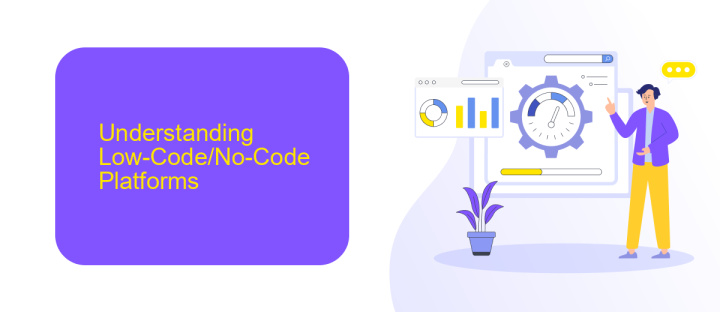Low-Code/No-Code Platform
Low-Code/No-Code platforms are revolutionizing the way businesses approach software development. By enabling users to create applications with minimal or no coding knowledge, these platforms empower a broader range of individuals to innovate and solve problems. This democratization of technology accelerates digital transformation, reduces development time, and lowers costs, making it accessible for startups and enterprises alike.
Introduction
Low-Code/No-Code platforms are revolutionizing the way businesses develop and deploy applications. These platforms empower users with little to no programming experience to create functional applications through intuitive drag-and-drop interfaces and pre-built templates. This democratization of software development accelerates the digital transformation process, making it accessible to a broader audience.
- Rapid development and deployment
- Cost-effective solutions
- Enhanced collaboration between IT and business teams
- Scalability and flexibility
- Integration with existing systems
One of the key features of Low-Code/No-Code platforms is their ability to integrate seamlessly with other services and applications. Tools like ApiX-Drive facilitate these integrations by providing a user-friendly interface to connect various APIs without requiring extensive coding knowledge. This capability ensures that businesses can streamline their workflows and enhance operational efficiency, all while reducing the dependency on specialized IT resources.
Understanding Low-Code/No-Code Platforms

Low-code and no-code platforms have revolutionized the way businesses develop applications by significantly reducing the need for extensive coding knowledge. These platforms provide visual interfaces with drag-and-drop features, allowing users to create applications quickly and efficiently. This democratization of app development means that even those with minimal technical skills can contribute to building functional software, thus accelerating innovation and reducing development costs.
One of the key advantages of low-code/no-code platforms is their ability to integrate seamlessly with other services and applications. For instance, ApiX-Drive offers a powerful solution for setting up integrations without requiring extensive coding. It allows businesses to connect various applications and automate workflows, enhancing efficiency and productivity. By leveraging such integration tools, organizations can ensure that their low-code/no-code applications are versatile and capable of interacting with a wide range of systems and services.
Benefits and Use Cases

Low-Code/No-Code platforms offer a myriad of benefits, making them an attractive option for businesses of all sizes. These platforms significantly reduce the time and cost associated with traditional software development, enabling faster deployment of applications. They empower non-technical users to create and modify applications, fostering innovation and reducing the dependency on IT departments.
1. **Accelerated Development**: Quickly build and deploy applications without extensive coding.
2. **Cost-Effective**: Lower development and maintenance costs.
3. **User Empowerment**: Enable non-developers to create and manage applications.
4. **Scalability**: Easily scale applications as business needs grow.
5. **Integration Capabilities**: Seamlessly integrate with existing systems using tools like ApiX-Drive.
These platforms are ideal for a variety of use cases, including internal business applications, customer relationship management (CRM) systems, and workflow automation. For example, ApiX-Drive can be used to automate data transfer between different applications, enhancing operational efficiency. By leveraging Low-Code/No-Code platforms, businesses can stay agile and responsive to changing market demands.
Challenges and Considerations

While Low-Code/No-Code platforms offer numerous benefits, they also come with their own set of challenges and considerations. One of the primary concerns is the potential for limited customization, as these platforms may not offer the same level of flexibility as traditional coding methods. This can be particularly problematic for businesses with highly specialized needs.
Another significant issue is the risk of vendor lock-in. Since these platforms are often proprietary, migrating to a different system can be difficult and costly. Additionally, there are security and compliance concerns, especially when dealing with sensitive data. Ensuring that the platform meets all regulatory requirements is crucial.
- Limited customization options
- Vendor lock-in risks
- Security and compliance issues
- Scalability limitations
Integration with existing systems is another challenge. While platforms like ApiX-Drive can facilitate seamless integration, it's essential to thoroughly evaluate how well the Low-Code/No-Code platform interacts with other tools and services. This ensures a smooth workflow and prevents potential disruptions.
Future of Low-Code/No-Code Platforms
The future of Low-Code/No-Code platforms is poised to transform the landscape of software development. As businesses seek to accelerate digital transformation, these platforms empower non-technical users to create sophisticated applications with minimal coding knowledge. This democratization of app development will lead to increased innovation, as more individuals can contribute their ideas without the traditional barriers of complex programming languages and frameworks.
Additionally, the integration capabilities of Low-Code/No-Code platforms will become more advanced, allowing seamless connections between various services and applications. Tools like ApiX-Drive will play a crucial role in this evolution, enabling users to effortlessly set up integrations without deep technical expertise. By automating workflows and synchronizing data across multiple systems, ApiX-Drive and similar services will enhance the efficiency and functionality of applications built on Low-Code/No-Code platforms. This synergy will drive the adoption of these platforms, making them indispensable in the toolkit of modern enterprises.
FAQ
What is a Low-Code/No-Code Platform?
Who can benefit from using Low-Code/No-Code Platforms?
Can Low-Code/No-Code Platforms be used for complex applications?
How secure are applications built on Low-Code/No-Code Platforms?
How can I integrate Low-Code/No-Code applications with other systems?
Time is the most valuable resource in today's business realities. By eliminating the routine from work processes, you will get more opportunities to implement the most daring plans and ideas. Choose – you can continue to waste time, money and nerves on inefficient solutions, or you can use ApiX-Drive, automating work processes and achieving results with minimal investment of money, effort and human resources.

